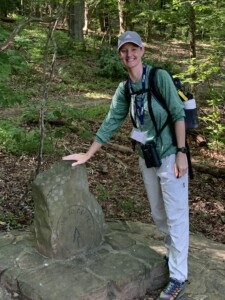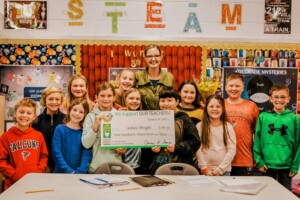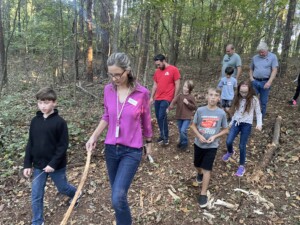 Teacher Conservation Workshop gets an A+
Teacher Conservation Workshop gets an A+
GUEST BLOG by Ashley Wright, Pike County Elementary School
I just had the honor of completing the Georgia Teacher Conservation Workshop, and WOW! What an incredible experience it was to join fellow educators and take a deep dive into our state’s incredible natural resources.
This (18th) annual five-day professional development in June immersed 19 other teachers and me into best practices for forestry and land management in Georgia. Sponsored by the Georgia Forestry Commission and Department of Natural Resources, Wildlife Resource Division the experience forced me to rethink the personal opinions I had held about logging and the industry in general. Seeing trees cleared when you’re driving past a harvest site can be disconcerting, but I finally understand how important the timber industry is to the economy in Georgia. I can now say my perspective has changed after witnessing first-hand the lengths these professionals go to, to protect the sustainability of the very resource that feeds their own families – not to mention the thousands of people who work alongside them.
At the nursery, representatives walked us through the grafting process, and we were all able to graft two pine trees together. The most interesting part was how they’re able to create stronger, more viable trees through a process that involves controlling how some of their heartiest trees are pollinated. I never knew that was possible, but they’ve found a way to artificially inseminate the female buds on a tree with a selected pollen source. One thing that rings true across the board is that there wasn’t a single part of the process that didn’t involve amazing technological advancements, and the fact that they use these advancements to build better systems and practices around the sustainability of our forests was such a light bulb moment for me. They care about what they do and how they do it in order to ensure the future health of our forests. They are so much more environmentally conscious about their decisions than I ever would’ve expected.
The folks from the Georgia Forestry Commission and the owners of the Gully Branch Tree Farm were the highlights of one of our day trips. We were able to see, and later understand, how prescribed fire is a beneficial and necessary practice for certain forests in Georgia, most especially the long leaf pine ecosystem.
The two mills we visited opened my eyes to the different jobs that young adults, fresh out of high school or college, can get that are nothing like what I imagined mill jobs to be. From the paper/pulp wood mill, Graphic Packaging, to the lumber mill, Interfor, my mind was blown by the technological advances that were already in place. It’s amazing to see a “control room” in a self-sustaining mill! Everything they do is focused on efficiency, and they leave no part of the process to chance. Every single piece of the tree is used, and anything left over becomes biofuel to run their entire operation. So, that means no coal was burned, only wood, which makes for a cleaner and much more self-sustaining operation.
The last couple of days we listened intently as a member of The Nature Conservancy explained more about prescribed fire and why it is such a necessary component for wildlife in the long leaf pine ecosystem, which included meeting the resident gopher tortoise at Charlie Elliott Wildlife Center. The people we met, who took the time to help us learn the ins and outs of this industry, were some of the most gracious individuals I’ve ever had the pleasure of speaking with.
One thing the program directors made sure of was that we not only meet the experts at the “boots on the ground” level but that we had numerous resources to bring back with us. What I still can’t get over is the amount of learning material I’m walking away with! Also, as an added benefit, I’m now Project Wild, Project WET, and Project Learning Tree-certified. And I’m planning to take my students on a field trip to the Flint River Nursery this upcoming year.
I’m so glad I went in with an open mind, asked hard questions, and learned everything I could from these individuals. I feel that I have a more informed, balanced view of what the forest industry is all about and the future possibilities it could bring for some of our kids interested in this field of work.
The Georgia Teacher Conservation Workshop is a once-a-summer opportunity for educators. For me, it was truly a once-in-a-lifetime experience that I will enthusiastically pay forward in the future.
Click here for more info! http://gatcw.org/


